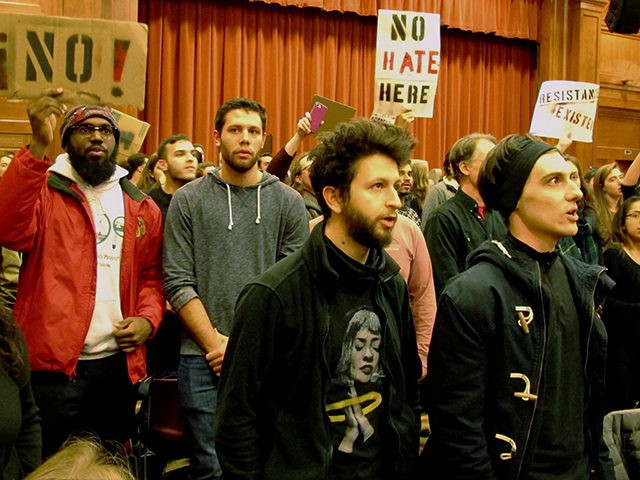According to a recent report from The Brookings Institute, guest speakers are most frequently disinvited from universities with the wealthiest student bodies.
Interesting new finding from @RichardvReeves: campus disinvitations most common at richest schools. https://t.co/FwRGDhb8ZS pic.twitter.com/fSJGNszuVX
— Jonathan Haidt (@JonHaidt) March 14, 2017
The research, which was conducted by Senior Fellow Richard V. Reeves, concluded that wealthier students are more likely to seek to disinvite controversial speakers from lecturing on their campuses.
“The pattern is clear,” Reeves argues, “the more economically exclusive the institution, the more likely the students have attempted to hinder free speech.”
The study was prompted by the violence and chaos that erupted at Middlebury College over an event featuring American Enterprise Institute Scholar Charles Murray. Reeves highlights that Middlebury students are amongst the wealthiest in the country.
Middlebury’s students are among the richest and most privileged in America. The average enrollee comes from a household making a quarter of a million dollars a year, according to recent research on universities and social mobility. As many students at Middlebury come from the top 1% of households (23%) as come from the bottom four quintiles (24%). The annual cost of attending is almost $64,000 a year.
According to the study, since 2014, there have been attempts at 90 colleges across the United States to disinvite controversial speakers, the majority of which were conservative. Interestingly, the average student at colleges where attempts have been made to disinvite speakers come from family’s with an annual income $32,000 higher than the national average.
Reeves points out that when Murray spoke at Saint Louis University, an institution where “the median income of students’ families is half Middlebury’s,” student attendees sat quietly while they listened to the lecture before they polite engaged with the speaker during the question and answer portion.
Jonathan Haidt, a social psychologist from NYU, told The Wall Street Journal that he believes that the ideological shift undergone on the left that runs rampant in academia is largely responsible for the increasing trend of students desiring to shut down speech.
The left, meanwhile, has undergone an ideological transformation. A generation ago, social justice was understood as equality of treatment and opportunity: “If gay people don’t have to right to marry and you organize a protest to apply pressure to get them that right, that’s justice,” Mr. Haidt says. “If black people are getting discriminated against in hiring and you fight that, that’s justice.”
Today justice means equal outcomes. “There are two ideas now in the academic left that weren’t there 10 years ago,” he says. “One is that everyone is racist because of unconscious bias, and the other is that everything is racist because of systemic racism.” That makes justice impossible to achieve: “When you cross that line into insisting if there’s not equal outcomes then some people and some institutions and some systems are racist, sexist, then you’re setting yourself up for eternal conflict and injustice.”
Tom Ciccotta is a libertarian who writes about education and social justice for Breitbart News. You can follow him on Twitter @tciccotta or email him at tciccotta@breitbart.com

COMMENTS
Please let us know if you're having issues with commenting.